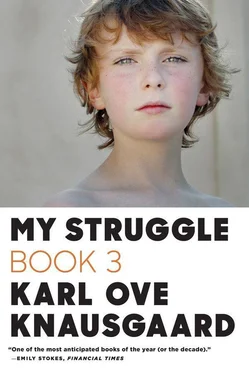“Anne Lisbet’s sick today as well!” someone said.
“And Solveig.”
“And Vemund.”
“And Leif Tore,” Geir said.
Then I remembered what had happened the night before.
“Vemund’s sick in the head!” Eivind said.
“Ha ha ha!”
“No, no, no,” Frøken said. “We are not nasty to anyone in this class. And certainly not behind their backs!”
“Leif Tore’s father was drunk yesterday!” I said. “My mom had to drive them to a relative’s house. That’s why he isn’t here today!”
“Shhh,” Frøken said, looking at me, holding a finger to her lips and shaking her head. Then she wrote something in her book before scanning the class.
“Anyone else away? No? So, let’s get started, shall we?”
She stepped forward and perched on the edge of her desk. “This week we’re going to learn about farms. Has anyone ever been to a farm?”
Oh, I shot up my arm as high as I could, almost standing up, shouting, Me, me, me! I have!
I wasn’t the only person to have something to say about the topic. And it wasn’t my hand Frøken pointed to but Geir B’s.
“I’ve ridden a horse in Legoland,” he said.
“But that’s not a farm ,” I screeched. “I’ve been to a farm lots of times. Grandma and Grandad —”
“Was it your turn, Karl Ove?” Frøken said.
“No,” I said, eyes downcast.
“It’s true that Legoland is not a farm,” she continued. “But horses are on farms, that’s true, Geir. Unni?”
Unni, who was that?
I turned. Ah, that’s the girl who was always giggling. Chubby with blonde hair.
“I live on a farm,” she said with flushed cheeks. “But we haven’t got any animals. We grow vegetables. And Dad sells them at the market in town.”
“But I’ve been to a farm with animals !” I said.
“Me too,” Sverre said.
“And me!” said Dag Magne.
“You’ll have to wait your turn,” Frøken said. “Everyone has to have a chance.”
She pointed to five other people before I was finally able to take my hand down and say what I had to say. Well, Grandma and Grandad had a farm, it was big, they had two cows and a calf, and they had hens. I had collected the eggs many times, and I had seen Grandma milking the cows in the morning. First she shoveled away the muck, and then she fed them, and then she milked them. Sometimes they lifted their tails and had a piss or a shit.
A wave of laughter rolled toward me. Emboldened by it, I continued. And once, I said, sitting there in class, my face crimson, one of the cows pissed on me!
I looked around and lapped up the ensuing laughter. Frøken said nothing, she pointed to someone else, but I could see from her face that she didn’t believe me.
When everyone who wanted to say something had had a turn, she read a passage from a book about Ola Ola Heia. She asked us questions about what she had read out, completely ignoring me until the bell rang, when she asked me to stay behind.
“Karl Ove,” she said. “Wait here. I need to have a word with you.”
I stood beside her desk while the others hurried out. When we were alone she perched on the edge of her desk and looked at me.
“We can’t tell everyone all the things we know about one another,” she said. “What you said about Leif Tore’s father, for example. Don’t you think Leif Tore would be upset about that?”
“Yes, he would,” I said.
“He wouldn’t want anyone else to know. Do you understand?”
“Yes,” I said, starting to cry.
“We all have private lives,” she said. “Do you know what that is?”
“No,” I said, sniffling.
“It’s everything that happens at home, in your home, my home, their homes, everyone’s home. If you see what happens in other people’s homes, it’s not always nice to tell others. Do you understand?”
I nodded.
“Good, Karl Ove. Don’t be upset. You didn’t know. But now you do! So off you go.”
I scampered up the stairs, through the hall, and onto the playground. Cast an eye over the various groups standing there. Some girls were doing French skipping with elastic, some with a rope, some were playing tag. Down on the soccer field I saw a mass of players in front of the nearest goal. The center of the field was covered in a pool of yellowish mud. Geir, Geir Håkon, and Eivind were standing by the bench below the little rock with the flagpole on it, and I ran over to join them. They were playing with Geir Håkon’s boat cards.
“Have you been crying?” Eivind said.
I shook my head. “It’s the wind,” I said.
“What did Frøken say then?”
“Nothing much,” I said. “Can I have a card?”
“You’ve been crying,” Eivind said.
Along with Sverre and me, Eivind was the best in the class. He was the best at math, Sverre was next best, and I was third best. I was best at reading and writing, Eivind was next best, and Sverre third best. But Eivind was much faster than me, and of the boys in the class only Trond was faster than him. I was the sixth fastest. And he was stronger than me. I was the next weakest, only Vemund was weaker, and since he was the fattest and the dumbest boy in the class, it wasn’t a very good situation, no one took any notice of him. Even Trond, the smallest boy in the class, was stronger than me. I was the third tallest in the class, a bit taller than him. I was the fourth best at soccer; ahead of me were Asgeir, Trond, and John, while Eivind was fifth best. I was better at drawing than him, but not as good as Geir, who could draw everything as it really was, and Vemund. As for throwing a ball, I was next to last, again only Vemund was worse than me.
“The wind was in my eyes as I came down the steps,” I said. “I wasn’t crying. Can I have a card too?”
The first card I took was SS France, the world’s biggest passenger liner, which walloped everybody else in all categories.
In the next lesson we wrote letters of the alphabet in our notebooks: u as in kui, a as in lam, å as in gås. For homework we had to write the same letters in our notebooks. Frøken asked whether anyone lived near the students who were absent today and, if so, could they pass on the homework.
But I didn’t become aware of the opportunity that had presented itself until the next and final lesson, which was gymnastics, as I was running round and round the tiny gymnasium. I could walk up to Anne Lisbet’s and tell her what we had to do for homework! The thought made me flush with pleasure. As soon as we had dressed and left the changing room, on the way up to the place where we lined up to wait for the bus, I told Geir about my plan. He wrinkled his nose, go to Anne Lisbet’s, why? We had never been there, that was one thing. And Vemund lived there, that was another. Couldn’t Vemund take the homework? You don’t understand, I said. The whole point is that we do it!
He still hemmed and hawed, but after I had put a bit more pressure on him, he agreed to go with me.
Instead of making everyone get off at B-Max, this morning the bus went up through the estate and dropped us off on the way. It did that now and then, and it was a strange sight every time, because the enormous bus didn’t belong there, on the narrow roads, it towered over everything like a liner in a canal. We stood on the sidewalk watching it go up the hill, as it groaned with the effort and released clouds of greasy fumes in its wake.
“Shall I go up or will you come down?” I said.
“You come up,” Geir said.
“OK,” I said, walking in the drive, which as fortune would have it was clearly empty. It was no longer raining, but everything I saw was wet. On the dark-brown wall there were extensive patches of black damp, on the brick doorstep all the little hollows were full of water, on the spade leaning against the wall raindrops hung trembling from the handle. I unzipped my jacket and took out the key to see if I could perhaps get it to open the door today. But the same happened, the key went in, but the little drum that was supposed to rotate didn’t budge. I looked up the road. No one there. So I went to the garbage can by the fence, took out the black half-empty bag, and put it on the ground, grabbed the garbage can by the handles, and lifted it. It was heavier than I had anticipated, and I had to put it down several times on the way to the house. Still there was no one to be seen on the hill. A car came past, but it wasn’t anyone I knew, so I carried the can across the lawn and placed it under the window. Clambered on top, lifted the window, and pushed my head and shoulders through. The feeling of losing control, because I couldn’t see if anyone was watching me, all I saw was the empty room in front of me, dark and hot, filled me with panic. I twisted and turned, and when I had half my body in, I grabbed the metal pipe on the tank and pulled myself through.
Читать дальше












